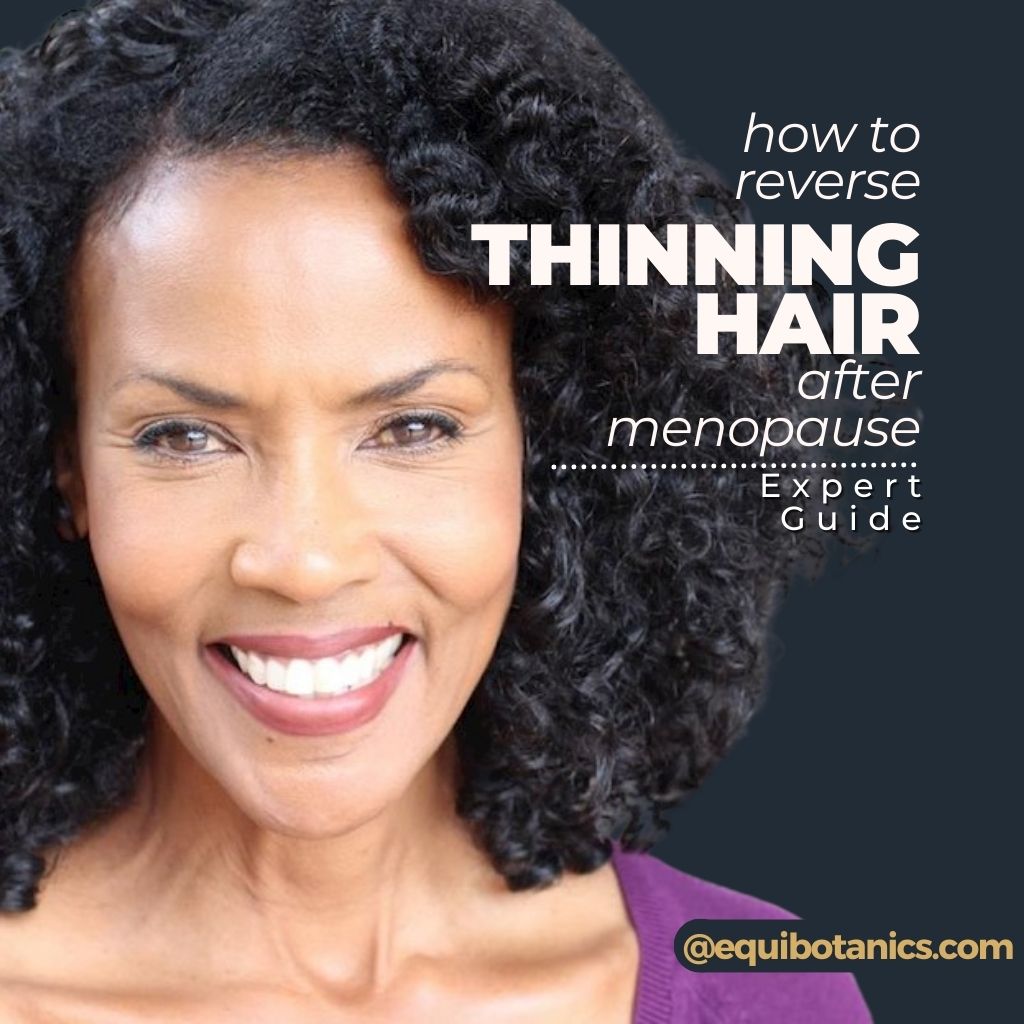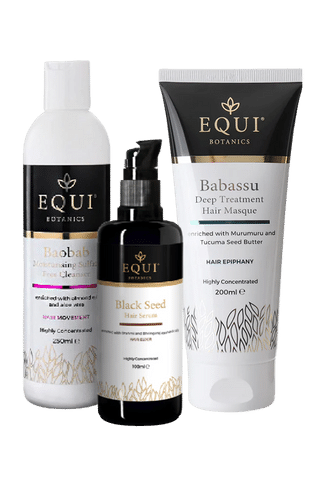
Most people will be affected by hair thinning or loss at some point in life, and for many women menopause is a time where hair is commonly affected.
Hair grows more slowly, becoming thinner, when hormone levels (particularly oestrogen) drop during menopause. Whilst it can be upsetting, hair loss and thinning are common occurrences as we age, with around 50% of women experiencing some kind of hair loss from the age of 65.
Thinning hair tends to take hold gradually and thankfully it can be reversed with some simple changes that are easy to adopt into everyday life. In this guide, we explore the possible causes along with how to reverse thinning hair after menopause.
What is menopause?

Menopause occurs when a woman’s periods permanently stop, and they are no longer able to become pregnant. This happens because of a drop in the level of the hormone’s oestrogen and progesterone. Typically, this occurs between the ages of 45-55 but it varies from person to person.
Sometimes menopause can occur earlier, reasons for this include:
- Cancer treatments such as chemotherapy
- Genetics
- Having a total hysterectomy
There are several stages to menopause, the first being known as perimenopause. It is at this point when a woman’s periods will stop. Other symptoms that can occur include mood swings, hot flushes, brain fog, anxiety, and irregular menstrual cycles.
It can take years before a woman’s periods stop completely but once that happens, the menopause stage is reached. Once you have been in the menopause stage for 12 consecutive months, you are then considered to have reached postmenopause. The postmenopausal stage is where you don’t get periods anymore, occasionally, menopause symptoms can remain for some time after this, but it isn’t common.
Can menopause cause hair loss?

It is important to identify whether the changes to your hair are actual loss or thinning as this can alter how you might treat it. Generally, during menopause it tends to be a bit of both, but sometimes the loss can be mistaken for thinning, as hair can sometimes get so thin that is invisible to the eye.
The change in hormone levels that occurs during the menopause can invoke hair loss as the body produces less oestrogen and progesterone. These two hormones work to keep hair healthy, encouraging quicker growth and reducing hair loss, therefore when the levels drop it can cause growth to slow and for some women, thinner hair.
This isn’t the only reason for hair loss or thinning during menopause however, and there can be other factors that mean you are experiencing this issue which are unrelated to the menopause. These include:
- Genetics- in some instances, hair thinning, and loss are genetic and occur at a similar age to the menopause, such as female pattern baldness.
- Medical conditions- autoimmune diseases, immune system deficiencies, and skin infections can all cause hair loss. Having an operation as well as some viruses can trigger hair loss, this is known as telogen effluvium. Finally, sudden weight loss can also result in thinning hair.
- Alternative hormonal changes- childbirth, post pregnancy and thyroid issues can all cause problems with hair loss and thinning.
- Medication- cancer treatments as well as some medications for depression and arthritis cause hair loss side effects.
- Hairstyles- tight hairstyles such as ponytails or buns, as well as hair extensions and weaves, can pull on your locks damaging follicles and resulting in traction alopecia.
- Stress- extreme stress can impact on your locks and cause hair loss as it increases the levels of the stress hormone, cortisol, in your body. When too much of this is produced, it can damage new hair growth.
- Diet- vitamins and nutrients are highly important to the health of your hair and can even alter the thickness of it. Consume a healthy, balanced diet with plenty of vitamin’s B and D, protein, and iron. It is worth considering introducing a collagen supplement because levels drop during the menopause, and this can negatively impact hair health and growth.
- Harsh products- using harsh hair care products such as shampoos containing sulphates can strip your hair of its natural oils which leave locks dry and brittle causing hair loss.
- Overtreating hair- regular and excessive use of treatments such as hair colour, relaxers, and perms can impact on scalp and hair health. Prolonged use of such treatments can even permanently damage hair follicles which can affect the rate and quality of hair growth.
Can it be reversed?
Whilst it is normal to lose between 50-100 hairs a day, when it becomes a larger quantity than that, it is only natural to worry. The good news is that menopausal hair loss is not usually permanent, and thinning is very much treatable.
It is important to treat hair gently when looking to reverse thinning and hair loss, both during and post menopause. Some ways to treat the issue include:
• Making changes to your wash routine
Ensure you apply products gently without tugging and rubbing too vigorously. It is important to always use a conditioner. Consider a product such as the Marula Leave In Conditioner, as this is going to work to protect your tresses from further damage whilst injecting them with moisture to encourage hair and scalp health.

• Switch up fabrics

Of course, once you have washed your hair it is most likely you will want to remove excess water, but instead of using a rough bath towel, invest in a microfibre one as this limits friction and breakages.
Silk is another important fabric when it comes to encouraging growth, again reducing friction but also matting which can lead to breakages and damage.
• Improve your diet

A healthy diet is important for so many aspects of life including your locks. If you are looking for post-menopausal hair loss remedies that are natural, then there is no better place to start then your diet. Look for foods with high levels of the following:
- Protein- chicken, eggs, dairy, nuts, chickpeas and tofu are all sources of protein. By increasing your intake of this vital nutrient, you will begin to see improvement in your hair’s structure and thickness.
- Iron- found in leafy greens such as spinach as well as red meat, iron works to deliver oxygen to your hair follicles but also helps your body to use protein for building strong hair.
- Zinc- helps to repair hair and maintain function of hair’s oil glands. Found in chickpeas, pumpkin seeds, and peanut butter.
- Vitamin C- helps with collagen production in hair cells which in turn protects against breakages. Sources include bell peppers, oranges, and tomatoes. As collagen production slows due to old age, it is worth permanently increasing your intake of this vitamin and not just for menopausal hair loss.
- Omega 3- found in oily fish, this helps to grow thick and healthy hair.
• Stimulate your scalp

The quality and rate of hair growth all starts at the scalp, which is often forgotten about.
Performing a simple, daily scalp massage is perfect if you are wondering what to do about thinning hair after the menopause as well as throughout it. Scalp massage can stimulate blood flow to the area to promote growth in addition to removing dead skin cells which create a healthy base for your locks to flourish.
Further improve the benefits of performing scalp massage by using a hair oil with growth stimulating qualities such as the Black Seed Hair Oil Elixir, or a serum that contains peppermint. Black seed oil is known for its abilities to reduce hair loss, stimulate regrowth, encourage blood circulation, and relieve any scalp conditions along with hydrating and conditioning your locks making it a great hair treatment all-rounder.
• Make styling changes

If you’ve noticed your hair becoming thinner, then lay off the heat styling tools for a while as this can make your hair more susceptible to breakage.
Try to allow hair to air dry where possible but if you do need to use heat then switch to a lower setting and always apply heat protectant.
Along with heat application, the use of chemical treatments such as hair dye, bleach, perms, relaxants, and chemical straightening can all make your hair strands and your scalp more vulnerable.
• Take a supplement

Like eating a balanced diet, introducing a daily supplement to your routine would be beneficial to your locks.
Increasing your intake of certain nutrients and vitamins is good for hair during and after the menopause. It is possible to get specific menopause supplements for hair loss as well as general hair, skin, and nail ones.
Look for supplements that contain the following:
- Folic Acid- this works to support your hair follicles and generate new growth.
- Vitamin B7- also known as biotin, this is great for improving the thickness and overall health of hair.
- Collagen- this naturally decreases as you age, particularly throughout the menopause as it relies on oestrogen production. Taking a supplement will help promote growth, thickening hair, and protecting against free radical damage.
• Use targeted hair products

There are a wide range of hair care products designed to treat hair loss or increase hair thickness.
If you want to boost the thickness of your locks, look for products that specifically mention volume. For hair loss, there are also medicated shampoos, although some are prescription only, so you would need to consult a doctor beforehand.
Whilst there are plenty of options to target hair thickness and shedding, some are not as supportive of hair health, as they contain ingredients such as sulphates which can have the opposite effect.
Consider a naturally derived range of products, such as the Hair Strengthener product set, as the ingredients will gently stimulate and strengthen tresses without the damage.
• Consult a doctor

Of course, if you are seriously concerned about your hair loss, for example, if it is coming out in clumps or you are in discomfort, then you should seek advice from your doctor.
Consulting a doctor, even if you are just worried by your hair loss, is a sensible idea. They may be able to offer you a treatment such as Minoxidil which is a prescription medication that can stimulate growth and slow hair loss.
• Try natural remedies
 There are some natural, home remedies that can work to stimulate hair growth. This is a great alternative to exposing your sensitive locks to harsh chemicals. These include:
There are some natural, home remedies that can work to stimulate hair growth. This is a great alternative to exposing your sensitive locks to harsh chemicals. These include:
- Apple cider vinegar - this can help to keep your scalp in tip top condition. Rinse hair with this once every two weeks to break down product residue and increase volume.
- Onion juice - with its high amounts of sulphur, the juice of onion is great as a natural alternative to regrowing hair as it increases circulation and blood flow to the scalp. It also regenerates damaged follicles and reduces any scalp inflammation.
- Marula oil - this little-known wonder is an easily absorbed oil that is great for thickening hair. It nourishes the scalp as well as encouraging growth.
Frequently Asked Questions
Will hair loss from menopause grow back?
The simple answer is yes, hair can grow back however it does not always return to normal after the menopause. Hair could grow back a different texture, for example, it could be thinner, but also sometimes it can grow back curlier than prior to loss.
How can I get thicker hair after the menopause?
Things that you can do for thinning hair due to the menopause include regular scalp massages, eating a balanced diet, reducing stress levels, taking supplements, and introducing naturally derived products.
How can I thicken my hair after 50?
Unfortunately, with age comes changes to hair and often they aren’t for the better. There are some steps you can take to thicken your hair and help thinning hair after the menopause, these include:
- Changing your hairstyle to create the illusion of volume
- Use thickening hair care products
- Introduce a supplement
- Increase vitamins and nutrients in your diet that are good for hair growth
Does biotin help menopausal hair loss?
Biotin is an essential nutrient for hair, whatever stage of life you are in, however it is known to be particularly important during menopause. Biotin works to support hair health, improves growth, and reduces scalp inflammation. Whilst there are hair care products that contain biotin, the best way to increase your levels is to take a supplement or find food sources with high levels of vitamin B7 in.
Is hair loss normal after menopause?
Hair loss after the menopause is very normal. Known as female pattern baldness, the chances of this occurring increase with age. With the fall in oestrogen and progesterone levels that occur during the menopause, hair becomes thinner, and the follicles shrink meaning it grows more slowly and falls out more easily.
Conclusion
Going through the menopause is a challenging time in a woman’s life without the added stress of hair loss and thinning. Some simple changes to the way you care for your hair as well as increasing your intake of the right vitamins and nutrients, can get your hair health back on track.


